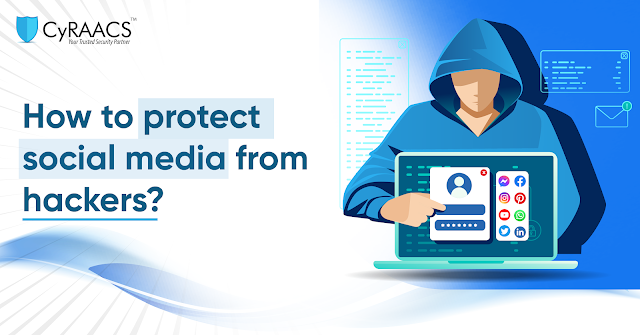How to protect social media from hackers?
Social media has progressed greatly since its beginning stages. What initially started as a way to connect with friends from all over the world has now become something that companies look at when hiring new employees. In today's digital age, it's not uncommon for people - especially teenagers - to post what they think is "cool" online in hopes of impressing those who they know will be viewing their page. However, what many people don't realize is that your social media following can include anyone from your friends and family to future employers - and depending on your privacy settings, everyone in between.
Few Things to Consider Before Posting on Social Media Post
·
Is it something you could be held responsible
for?
·
Is it okay if your teacher or future boss sees
this?
·
Is it something you would let your parents see?
While social media can be fun, it's important to be aware of
the risks that come with it. Here are some of the Risks that you should watch
out for:
What are the Risks of Social Media?
With all of the information that's floating around on social
media, it's no wonder that hackers have such an easy time snagging people's
data. Hackers are constantly finding new ways to access people's information,
and social engineering is one of their favorite methods. They'll send you an
enticing message on Instagram, email, or any other social media platform, but
what you don't realize is that these seemingly harmless messages are actually
injected with malicious code that allows hackers to steal your identity, inject
malware into your computer, or steal your financial information - just to name
a few of the possibilities. So be careful what you click on, even if it seems
like it's coming from a friend!
Hackers use URL
shortening tools to disguise malicious links as trustworthy websites.
Unsuspecting people click on these links, not knowing that they're being taken
to a dangerous domain. This is how hackers achieve their goals.
Identity theft is a common crime committed by hackers on
social media. They acquire your personal information which is stored on social
media sites and use it to their advantage. Even if you keep your profile in the
highest security setting, there are ways that identity thieves can bypass them.
Most social media sites require mandatory information like your email address
and birth date, which makes it easy for an identity thief to hack into your
email address by using publicly available information.
A common method that
identity thieves use to obtain personal information is by taking advantage of
the "forgot password" feature on websites and recovering information
from the email address that is given there. Once they have access to your email
account, they can see everything you've made available on social media sites.
They can also mimic your identity to send all kinds of messages to your
contacts.
Now that you know about the risks associated with social
media, here are a few ways to help keep yourself safe:
1-Limit the Information You Share on Social Media
Be cautious of the amount of personal information you post
on social media. The more information you make available, the greater the
chance hackers have of exploiting you. For example, if all you have is a dummy
email address on your account, hackers will be limited to that. However, if you
have more information available, they could potentially use it to gain access
to your banking accounts depending on your security questions.
2-Keep your account Security High
Every social media site has different security and privacy
settings. Make sure to go through each site's settings and ensure that your
profile is set to a high-security level. For example, you can keep your account
private and only accept requests from people you know personally.
3-Clickjacking: Beware of Clicking
When you're sent new links from friends, it's generally safe
to assume they're okay to open. But be extra careful of any links you receive
from people you don't know - these could be carrying malware, phishing
programs, or even spyware. It's always best to err on the side of caution when
it comes to clicking on links from social media, as you never know what might
be waiting for you on the other side.
4-Simple Ways to Strengthen Your Passwords
It's important to use a variety of characters in your
passwords to make them secure. This includes lowercase and uppercase letters,
numbers, and special characters. Did you know that you can also use space bars
in your passwords? Mix and match different character types to make your
passwords complex and difficult to crack. Using simple passwords leaves you
vulnerable to hacking attempts like brute force and dictionary attacks. To keep
yourself safe, it's important to change your password frequently.
5-Always Use Separate Email Accounts
Using a separate email account for social media and personal
use can help prevent complications if one account is compromised. For example,
if a cybercriminal gains access to the email you use for social media, he may
not be able to get into your personal account if it is separate. This can help
protect your personal information from being accessed.




Comments
Post a Comment